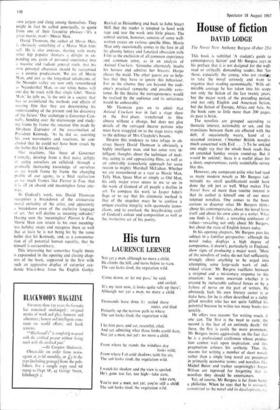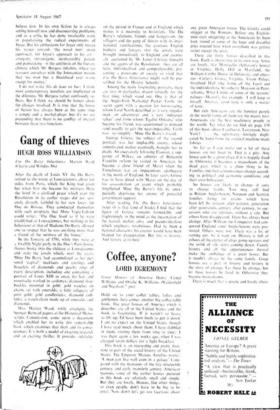House of fiction
DAVID LODGE
The Novel Now Anthony Burgess (Faber 25s)
This book is subtitled 'A student's guide to contemporary fiction' and Mr Burgess says-in his preface that it is not designed for the well- read or critically demanding reader, but 'for those, especially the young, who are want to take the novel seriously and want to organise their reading economically.' With ad- ' mirable courage he has taken into his scope not only the fiction of the last twenty years, but the major work of the preceding period, and not only English and American fiction, but the fiction of Europe, Africa and Asia. As the book runs to little more than 200 pages, its pace is brisk.
The novelists are grouped according to thematic interest, nationality or sex, and the transitions between them are effected with the deft, if occasionally weary, hand of a seasoned reviewer. ('Another British novelist much concerned with Evil . . .') To be unkind one might say that the whole book reads like an extended Sunday review round-up. But it would be unkind : there is a useful place for a short, unpretentious, easily assimilable survey like this.
However, any competent critic who had read as many modern novels as Mr Burgess (ad- mittedly no small qualification) could have done the job just as well. What makes The Novel Now of more than routine interest is that its author is- himself one of our most talented novelists. One comes to the book curious to discover what Mr Burgess thinks about his contemporaries, about the novel form itself and about his own aims as a writer. What one finds is, I think, a revealing confusion of values—revealing not only about Mr Burgess. but about the state of English letters today.
In his opening chapters, Mr Burgess puts his subject in a familiar perspective: although the novel today displays a high degree of competence, it doesn't, particularly in England, show signs of producing a major work. 'Most of the novelists of today do not feel sufficiently 'strongly about anything to be urged into attempting some large-scale work of indi- vidual vision.' Mr Burgess vacillates between a resigned and a missionary response to this situation: he seems uncertain whether it is created by ineluctable cultural forces or by a failure of nerve on the part of writers. He obviously feels his own literary career is at Stake here, for he is often described as a richly gifted novelist who has not quite fulfilled his potential because he writes too many books too quickly.
He offers two reasons 'for writing much. if one can. The first is the need to earn; the second is the fear of an untimely death.' Of these, the first is easily the more prominent. Mr Burgess insists aggressively on the fact that he is a professional craftsman whose produc- tion cannot wait upon inspiration; and this pragmatism colours his aesthetic. Thus the reasons for writing a number of short novels rather than a single long novel are presented in primarily economic terms; and novelists like Michel Butor and (rather surprisingly) Angus Wilson are reproved for forgetting that a., novelists they should be. entertainers.
Yet, of course, Mr Burgess is far from being a philistine. When he says that he is serion.!•., committed to the novel and its developn-ent,
believe him. In his own fiction he is always setting himself new and disconcerting problems; and as a critic he has done invaluable work in popularising the radical experiments of Joyce. But his enthusiasm for Joyce only makes his stance towards 'the novel now' more equivocal. for Joyce's approach to his art- arrogant, intransigent, inexhaustibly patient and painstaking --is the antithesis of the literary climate which Mr Burgess inhabits, where we reassure ourselves with the Johnsonian maxim that 'no man but a blockhead ever wrote except for money.'
I do not write this de haw en has: I think most contemporary novelists are implicated in the dilemma Mr Burgess rather confusedly. re- flects. But I think we should be honest about the choices ins ;dyed. It is true that the house of. fiction has always been at the same time a temple and a market-place: but its no use pretending that there is no conflict of interest between these two functions.































 Previous page
Previous page